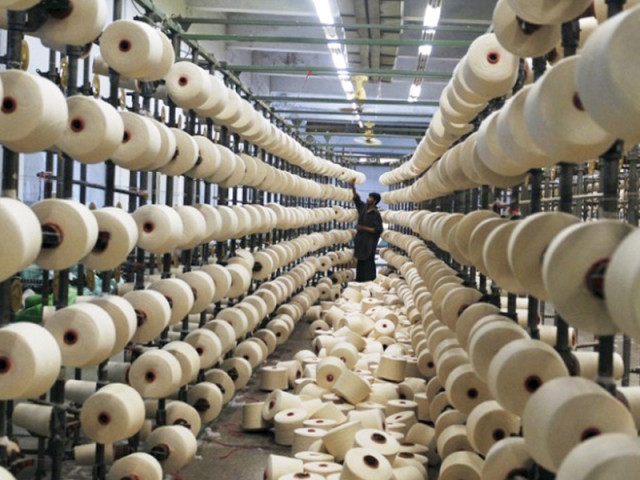APTMA wants 5% import duty slapped on cotton yarn
Chairman says India’s subsidies hurting Pakistani market.

The demand of levying a 5% duty on yarn import is against APTMA’s earlier stance. PHOTO: FILE
Speaking to The Express Tribune, Siddik said that APTMA – an industry group and one of the most powerful business lobbies in the country – has already reached out to the government.
“Soon after Pakistan received the Generalised System of Preferences (GSP) Plus status, India started heavily subsidising its textile sector,” said Siddik. “This is why Indian yarn is fast making the local yarn uncompetitive in the Pakistani market.”

The import of yarn in Pakistan has jumped significantly, which has hurt the local industry especially in the last few months, he added.
Meanwhile, the value-added textile sector has already opposed the proposal of imposing a 5% duty on yarn import.
“We oppose and will continue to oppose this proposal because it will definitely give at least 5% profit to local spinners,” said Pakistan Apparel Forum Chairman Jawed Bilwani. “This will hurt the finished goods exports of the country.”
Explaining his position, Bilwani said that APTMA’s concern was unreasonable since it had earlier demanded the government to promote a free market mechanism in the country in 2010.
The demand of levying a 5% duty on yarn import is against APTMA’s earlier stance.
Producers of finished textile goods in the country oppose any import duty on yarn as it may increase their cost of production. They say an increase in the price of the local product would diminish chances of any jump in Pakistan’s export to the EU – something that the country expects to see after the GSP Plus status.
Apparently, yarn producers in Pakistan are feeling the heat of a continuous drop in the export of yarn to China — currently the biggest market for Pakistani yarn. Moreover, Indian subsidies to its textile industry are also reportedly hurting the interests of Pakistani yarn exporters in China.
Alternate Research recently reported that Chinese demand for Pakistani yarn fell towards the end of last year as the country reported a huge inventory of imported yarn. There were rumours that China is discontinuing its yarn procurement policy. This can hurt yarn exporters but, with the reduction in yarn demand from China, local yarn prices are expected to come down that may help the value-added sector in the country.
During the first 6 months (July to December) of fiscal year (FY) 2014, total textile exports of Pakistan stood at $6.9 billion against $6.4 billion in the first 6 months of FY13, showing a growth of 8%.
Pakistan exported textile products worth $13.1 billion in FY13, which was 53% of Pakistan’s total exports. The exports were higher than FY12 ($12.35 billion) but were still below the figure of FY11 when the country registered record high textile exports of $13.78 billion due to high cotton prices in the world market.
Published in The Express Tribune, March 11th, 2014.
Like Business on Facebook, follow @TribuneBiz on Twitter to stay informed and join in the conversation.



















COMMENTS
Comments are moderated and generally will be posted if they are on-topic and not abusive.
For more information, please see our Comments FAQ